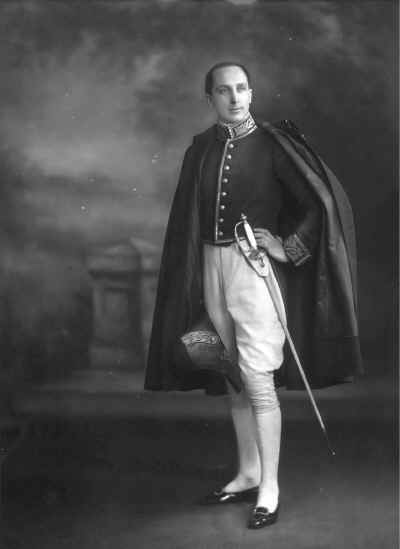|
URRIOLAGOITIA, M.
Neg. No: (GP) 8460A
Neg. Size: 15"x12"
Neg. Date: 11-06-1920


Sitter: Mamerto Urriolagoitia Arriague, later Señor Don Mamerto
Urriolagoitia (cr. c.1922) (1894-1974).

Biog: 1st Secretary and sometime Chargé d'Affaires at the
Bolivian Legation in London, post 1914 until 1927; President of Bolivia.
| Source:
Embassy of Bolivia, London:
"...Ex
President of the Republic, Lawyer, Diplomat and Politician.
Born in Sucre 5 12 1894. Parents: Mamerto Urriolagoitia and
Corina Arriague Moreno. Wife: Juana Hernandez Calvo.
During his period as Vice President of the Republic for the
Government of Doctor Enrique Hertzog (1947-1951), due the President's
resignation, he assumed constitutionally the command of the
nation on the 24th October 1949, a role he had been performing
already for months before. His government was distressing
and unstable and the political passions exacerbated and exploited
in a Civil War in August 1949. "Urriolagoitia was
not a statesman of exceptional merits nor an outstanding lawyer.
He was a diplomat, a man with a refined character and life,
a mixture of the Basque temperament with the English spirit
in which he was raised." He got to the Presidency
due to a series of circumstantial facts that have not been clarified
historically yet. A close friendship linked him with the
three great miners, especially to Aramayo. He imposed
tough policies, mixed with other social classes and his opponents
situated [sic] his politics as extreme right. In
1951 he was forced to surrender to a Military Junta to prevent
the MNR, winner of the 1951 elections, assuming power, an act
that history knows as the 'Mamartezo.'" Cecil
Beaton, My Bolivian Aunt: A Memoir, Weidenfeld and Nicolson,
London, 1971
[p 81] The ladies of the Beni had all the time in the world for
playing bridge and my aunt had become quite adept. Now she took
up the game again in Maida Vale, and there was never difficulty
in making up a four. New arrivals – young Secretaries at
the Consulate – found their way to her flat and enjoyed
her friendly company. Of these Mamerto Urriolagoitia, one of the
senior Secretaries, impressed me most by his manners, his [p 82]
deference to my aunt, his sense of polite amusement, and the way
in which he implied that he took his career very seriously. Urrio,
as he was known, had a slow smile and a fascinating mystery about
the eyes – eyes that had a somewhat unseeing, slow regard
– which all the dark and wide-eyed young ladies found irresistible.
Even as a young man he had become almost bald, and strangely enough
this gave him added distinction. I was intrigued to see that one
of his thumbs was missing. |
Date: 11 June 1920.
Occasion: Invited to the Court - Diplomatic Circle, 10 June
1920, with the Bolivian Minister, Mons. Ballivian's party.
Location: The Lafayette Studio, 179 New Bond Street, London,
W.
Descr: FL standing.
Costume: Civil uniform, Full dress.
Furniture & Props: Painted backdrop.

Photographer: Lafayette Ltd., 179 New Bond Street, London.
Evidence of photographer at work: Clamp visible.
No of poses: 3.
urr8460b.html
urr8460.html

Copyright: V&A Provenance: Pinewood Studios; acquired
1989.

References:
Biog: Whitaker's Alamanc, 1915-1928.
Occasion: The Times, 11 June 1920, p 20a.
Costume: Herbert A.P. Trendell (ed.), Dress and Insignia
Worn at His Majesty's Court, London, 1921.
Reproduced: -

Additional Information: -

Acknowledgements: Dalia Ventura

|
